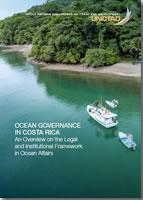
The present Report1 is prepared within the framework of the project “Evidence-based and policy coherent oceans economy and trade strategies” (Project).2 The Report provides an overview of international and national legal instruments for ocean governance within the Costa Rican context, as well as the competent national institutions, relevant to oceans economy and trade strategies that will be developed in subsequent phases of the Project.
Ocean governance is generally understood to encompass the legal and institutional frameworks for the management of ocean space, activities and marine resources, with the view to maintaining the ocean health, productivity, and resilience.
Section 1 of the Report provides an overview of relevant provisions of the United Nations Convention on the Law of the Sea (UNCLOS)3 and how these have been implemented within Costa Rica.
Section 2 addresses a general overview of the institutional framework in Costa Rica, and the main international and national provisions on the conservation and sustainable use of marine living resources.
In this regard, it should be pointed out that international instruments are incorporated in the Costa Rican national legal system once the respective instrument is ratified or approved by the Parliament through a specific law or adhered by the Executive Power through an Executive Decree.
Thereafter, section 3 addresses the four subsectors identified as national priorities in the Project, namely:
Sustainable marine fisheries (all fish but tuna)
Sustainable wild tuna harvesting/fishing sector (only tuna species)
Sustainable crustacean aquaculture
Seafood manufacturing sector
In the final part of the Report (section 4), an overview of specific cross-cutting legal frameworks is provided, namely: regulations on trade, maritime terrestrial zone, navigation, water pollution, and marine tourism, as well as additional institutions, such as the judicial branch and the national apprenticeship institute.
In addition, trade linkages are flagged throughout the different sections in the Report.


